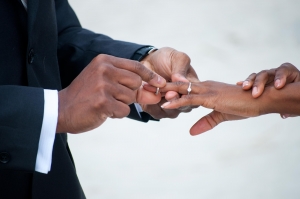Just days ago, the Maryland Senate approved a marriage equality bill that would allow the state to issue marriage licenses to all couples otherwise legally permitted to marry, regardless of the sex of the individuals involved. Now that the bill has successfully moved through the state legislature, it moves on to the desk of Governor Martin O’Malley (D), who is expected to sign the bill. Passage of the bill would make Maryland the 9th state to permit same-sex marriage, along with Washington, Vermont, New Hampshire, Massachusetts, Connecticut, New York, Iowa, and Washington, D.C.; and I, along with many prominent legal and religious groups, including the Maryland State Bar Association, Catholics for Equality, the Unitarian Universalist Association, and the National Gay and Lesbian Task Force Action Fund, applaud the Maryland marriage equality legislation.
Unfortunately, the legislation is subject to a voter referendum and opponents of marriage equality are expected to begin obtaining the requisite number of signatures to invoke a vote on the bill in the general election in November.
What opponents of marriage equality fail to realize is that marriage is, at its basic core, a legal contract between two consenting adults that does not rely on the involvement of the church for validity. The Maryland legislation recognizes that the choice to involve the church, a member of the clergy, or a religious institution in the wedding ceremony is as much a choice as the couple’s choice of flower arrangements, the style of the bride’s gown, and whether to have a flower girl or ring bearer included in the wedding party. All of these things make the wedding ceremony personal to the couple themselves, as does the choice of whether and how to include God or religion in the wedding ceremony, but the legal validity of a marriage is not dependent on these things.
Just like the permission of the church is not needed for a couple to legally divorce, the blessing of the church should not be required in order to legally validate a marriage. In fact, recognizing that the legal requirements for marriage may be different than the religious requirements for marriage, the Maryland legislation protects the right of a church and the clergy to refuse to perform religious wedding ceremonies if they are opposed to the union.
While marriage is, at its simplest, a legal arrangement, at its most complex, it is an intricate kinship in which all persons must be given the opportunity to engage. Marriage is the creation of a partnership that needs to be nurtured through all of life’s joys and struggles – through the highs and lows of raising children (or not raising children); through the thrill of job promotions and agony of job losses; through the pain of dealing with the death of loved ones; through medical conditions and health concerns; through financial gains and losses; through the monotony of daily chores and the fulfillment of lifelong dreams. Marriage is about sharing a life, becoming a family (with or without children), and supporting each other so that as a whole the couple is greater than the sum of its individual parts.
Marriage is about the commitment that two people make to each other, and not about the way in which the wedding ceremony was performed or who performed it. A few months ago I was fortunate enough to officiate the wedding ceremony of my brother-in-law and his new bride, and it was probably one of the proudest moments of my life. Not because I was the one responsible for signing the marriage certificate or because I got to say the words “I now pronounce you husband and wife” (though, admittedly that was a pretty cool moment), but because I was able to publicly affirm the commitment that they had made to each other. Like all married couples, they will face their share of heartache and bliss, harmony and stress, and it is their commitment to each other that will validate their marital relationship
A commitment as profound as the marriage commitment depends on the support of friends, family, and community in order to endure. While the relationships of same-sex couples may have the support of family and friends, without marriage equality, same-sex couples lack the same societal support for their relationship that heterosexual couples enjoy. A commitment as monumental as that of marriage not only relies on, but deserves, the respectful acknowledgement of society.
I can’t help but wonder whether those who oppose marriage equality do so as an attempt to assuage the vulnerability of their own marital relationship. By failing to acknowledge, respect, and validate the marriage of same-sex couples, it is a way for them to elevate the status of their own marriage. What these folks fail to realize is that by doing so, they are disrespecting their own marital relationship by admitting that without the label of “marriage,” their relationship would be less likely to endure.
While I am fearful of the potential reversal of Maryland’s marriage equality legislation, for the moment, I am sanguinely hopeful. One more state has realized the absurdity of marriage inequality and is helping to tip the scales in favor of equality so that perhaps by the time my children are adults, they will be free to marry – or not marry – whomever they choose, in whatever way they choose.


5 Comments
Pingback: Guilty Pleasures « Random Reflectionz
Pingback: The Pragmatic Believer « Random Reflectionz
Pingback: On Fire | Random Reflectionz
Pingback: Growing Pains | Random Reflectionz
Pingback: Faith in Marriage, Faith for Marriage